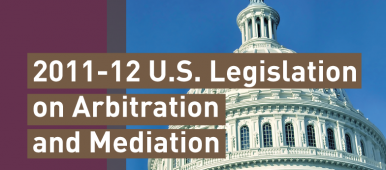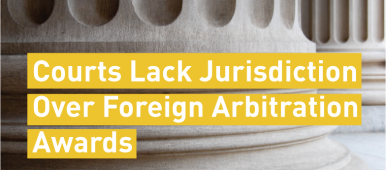
- Mediation
- Arbitration
- Court Neutrals
- Online Dispute Resolution
- Technology
- Court Decisions
- More
- Legislation
- Healthcare
- Guest Posts
- John DeGroote
- John C. Fleming
- Rick Freeman
- Professor Peter Friedman
- Honorable W. Royal Furgeson, Jr.
- James M. Gaitis
- Laura A. Kaster
- Professor John Lande
- Philip J. Loree, Jr.
- Michael McIlwrath
- F. Peter Phillips
- Professor Alan Scott Rau
- Professor Thomas J. Stipanowich
- Professor S.I. Strong
- Richard Webb
- Glen M. Wilkerson
- International arbitration
- Regulation
- Sports and Entertainment
- We’re Back!!!!Well, it’s been a while since we published and that is about to change. Since I spent much of last year becoming
 JAMS Welcomes Karl Bayer to its Panel of NeutralsJAMS, the world’s largest private alternative dispute resolution (ADR) provider, is pleased to announce that Karl Bayer
JAMS Welcomes Karl Bayer to its Panel of NeutralsJAMS, the world’s largest private alternative dispute resolution (ADR) provider, is pleased to announce that Karl Bayer Class Action Waivers in Arbitration Agreements: The Twenty-First Century Arbitration Battleground and Implications for the EU CountriesLinda S. Mullenix, Morris & Rita Atlas Chair in Advocacy at the University of Texas School of Law, has written “Class Ac
Class Action Waivers in Arbitration Agreements: The Twenty-First Century Arbitration Battleground and Implications for the EU CountriesLinda S. Mullenix, Morris & Rita Atlas Chair in Advocacy at the University of Texas School of Law, has written “Class Ac Picking the Proper Technological Tool for Problem-Solving in ArbitrationProfessor Amy J. Schmitz, John Deaver Drinko-Baker & Hostetler Chair in Law and Co-Director of the Translational Data An
Picking the Proper Technological Tool for Problem-Solving in ArbitrationProfessor Amy J. Schmitz, John Deaver Drinko-Baker & Hostetler Chair in Law and Co-Director of the Translational Data An
Recent Posts
Thanks to our 2012 Disputing contributors!
Over the course of the past year, we were honored with contributions from a number of the most esteemed law professors and practitioners we know. Some wrote guest-posts, others submitted comments via e-mail, while others made sure we never missed important developments in ADR. We would like to thank our blog contributors for improving Disputing‘s legal scholarship! Special thanks to our regular blogger Holly Hayes, and 2012 interns Renée Kolar and Jeremy Clare. Check out our 2012 blog contributors: S.I. Strong Currently a Fellow of the Supreme Court of the United States for the 2012-13 term, S.I. Strong is Associate Professor of Law at the University of Missouri and Senior Fellow at the award-winning Center for the Study of Dispute Resolution, having previously taught law at the University of Cambridge and the University of Oxford in the United Kingdom. Prior to joining the faculty at Missouri, Dr Strong was Counsel specializing in international dispute resolution at Baker & McKenzie LLP and a dual-qualified practitioner (U.S.-England) in the New York and London offices of Weil, Gotshal & Manges LLP. Dr Strong has acted in arbitral proceedings under a wide range of institutional rules and is listed as a neutral on various national and international rosters. Dr Strong is the author of numerous works on international arbitration, including the award-winning article, The Sounds of Silence: Are U.S. Arbitrators Creating Internationally Enforceable Awards When Ordering Class Arbitration in Cases of Contractual Silence or Ambiguity? 30 Michigan Journal of International Law 1017 (2009), as well as the books Research and Practice in International Commercial Arbitration: Sources and Strategies (2009) and Class Arbitration and Collective Arbitration: Mass Claims in the National and International Sphere (forthcoming), both from Oxford University Press. Dr Strong, who is qualified as a lawyer at the New York and Illinois bars and as a solicitor of the Supreme Court of England and Wales, holds a Ph.D. in law from the University of Cambridge, a D.Phil. from the University of Oxford, a J.D. from Duke University, an M.P.W. from the University of Southern California and a B.A. from the University of California. Find Professor Strong’s contributions here. Allan Scott Rau Alan Scott Rau is the Mark G. and Judy G. Yudof Chair Professor of Law at The University of Texas at Austin School of Law. He received his BA and LLB from Harvard University. Professor Rau teaches and writes in the areas of Contracts and Alternative Dispute Resolution (particularly Arbitration). He is co-author of Processes of Dispute Resolution: The Role of Lawyers (3rd ed., 2002); ADR and Arbitration: Statutes and Commentary (West, 1998), and Cases and Materials on Contracts (West, 2nd ed. 1992), and the author of several articles, including most recently “The Arbitrability Question Itself” (American Review of International Arbitration, 1999); “La Contractualisation de l’Arbitrage: Le Modele Americain” (Revue de l’Arbitrage, 2001), and “All You Need to Know About Separability in Seventeen Simple Propositions” (American Review of International Arbitration, 2003). He serves on the Commercial and International Panels of the American Arbitration Association, and has been a visiting faculty member at the University of Toronto, China University of Political Science and Law in Beijing, Willamette University College of Law, the University of Geneva; and the Universities of Paris-I and Paris-II. Some of Professor Rau’s scholarly papers may be downloaded at the Social Science Research Network. Professor Rau’s posts are here. Peter S. Vogel Peter S. Vogel is a trial partner at Gardere Wynne Sewell LLP where he is Chair of the Electronic Discovery Group and Co-Chair of the Technology Industry Team. Before practicing law he worked as a computer programmer, received a Masters in Computer Science, and taught graduate courses in information systems. For 12 years he served as the founding Chair of the Texas Supreme Court on Judicial Information Technology which is responsible for helping automate the Texas court system and putting Internet on the desktops of all 3,200 judges. Peter has taught courses on the Law of eCommerce at the SMU Dedman School of Law since 2000. Many of Peter’s topics are discussed on his blog www.vogelitlawblog.com. Read Peter’s posts here. Don Philbin Don Philbin, J.D., M.B.A., LL.M., is an AV-rated attorney-mediator and adjunct professor of law. Philbin has extensive experience and education in the fields of business, law, negotiation, and mediation, and mediates individual and class matters in a range of substantive areas. He teaches academic and professional skill courses at Pepperdine Law’s top-rated Straus Institute for Dispute Resolution and in other programs. Mr. Philbin’s most recent venture is Picture It Settled®, which develops software to help litigants analyze positions and develop successful concession strategies in negotiation. The free app, Picture It Settled® Lite, is currently available on Apple, Android and BlackBerry smartphones. The empirical research arising from this large collection of negotiation patterns also informs his mediation practice, teaching and writing. Don Philbin was one of three Texas mediators listed in the inaugural edition of The International Who’s Who of Commercial Mediation (2011; one of five Texas mediators in the 2012 edition), was recognized as the 2011 Outstanding Lawyer in Mediation by the San Antonio Business Journal, and is repeatedly listed in: The Best Lawyers in America, Texas Super Lawyers, The Best Lawyers in San Antonio, and the U.S. News and Best Lawyers “Best Law Firm” survey. Don Philbin is a charter and executive committee member of the Texas Academy of Distinguished Neutrals, and an elected fellow of the International Academy of Mediators and the American Academy of Civil Trial Mediators. In addition, Philbin was one of the first U.S. mediators certified under the international standards established by the International Mediation Institute. Don’s posts are here. Rustaum Dubash Rustam Dubash is the head of Penningtons’ commercial dispute resolution team and also head of the India group. He has been a partner at Penningtons since 1998 and has over 25 years of commercial dispute resolution experience. He has been involved in high value UK and cross border litigation and international […]
Continue reading...2011-12 U.S. Legislation on Arbitration and Mediation
The following bills relating to alternative dispute resolution were introduced by the 112nd U.S. Congress. The session convened in Washington, D.C. on January 3, 2011 and ended on January 3, 2013. Bills that became law: Patent Reform Act of 2011 (a.k.a. America Invents Act). The Act provides, among other things that parties to a derivation proceeding may resolve the dispute via arbitration. See Section 135(f). H.R. 1249; Status. H.R. 1249 was signed by President Obama on Sept. 16, 2011 and became Public Law No. 112-29. Department of Defense and Full-Year Continuing Appropriations Act of 2011. Provides, among other things, that “None of the funds appropriated or otherwise made available by this Act may be expended for any Federal contract for an amount in excess of $1,000,000 unless the contractor agrees not to—1) enter into any agreement with any of its employees or independent contractors that requires, as a condition of employment, that the employee or independent contractor agree to resolve through arbitration any claim under title VII of the Civil Rights Act of 1964 or any tort related to or arising out of sexual assault or harassment, including assault and battery, intentional infliction of emotional distress, false imprisonment, or negligent hiring, supervision, or retention.” H.R.1473; Status. The Act was signed by the President on April 15, 2011 and became Public Law No. 112-10. Bills that did not pass: Consumer Mobile Fairness Act of 2011. The bill would amend title 9 of the United States Code to prohibit mandatory arbitration clauses in contracts for mobile service. S. 1652; Status. Disaster Recovery Act of 2011. The bill would create a dispute resolution program to facilitate an efficient recovery from major disasters. S. 1630; Status. Personal Data Protection and Breach Accountability Act of 2011. As introduced, the bill provides that “the rights and remedies afforded by this section shall not be abridged or precluded by any predispute arbitration agreement. S. 1535 IS; S. 1535 RS; Status. Emergency Jobs to Restore the American Dream Act. The bill would create an emergency jobs program during 2012 and 2013. The bill provides that each unit of general local government that is an entitlement community and each State that receives funding under the Act shall agree to the arbitration procedure described in the Act to resolve certain disputes. H.R. 2914; Status. American Specialty Agriculture Act. The Act would create a non-immigrant H-2C work visa program for agricultural workers and provides that any H-2C worker may, as a condition of employment with an employer, be subject to mandatory binding arbitration and mediation of any grievance relating to the employment relationship. H.R. 2847; Status. Arbitration Fairness Act of 2011. Declares that no predispute arbitration agreement shall be valid or enforceable if it requires arbitration of an employment, consumer, or civil rights dispute. S.987; Status. H.R.1873; Status. Lat year, the ABA sent a letter to the sponsors of the legislation expressing concerns regarding certain specific language in the bill that could inadvertently void existing international commercial arbitration agreements and potentially discourage international commercial parties from engaging in commerce with U.S. parties. Labor Relations First Contract Negotiations Act of 2011. Amends the National Labor Relations Act to require mediation and, if necessary, binding arbitration of initial contract negotiation disputes. H.R.129; Status. Surface Transportation Board Reauthorization Act of 2011. Certain appropriations for the Surface Transportation Board, including requiring the Board to establish a binding arbitration process to resolve rail rate, practice, and common carrier service disputes. S.158; Status. Endocrine Disruptor Screening Enhancement Act of 2011. “In the event of any dispute about an appropriate share or a fair method of determining an appropriate share of applicable costs of the testing requirements in a test order, any person involved in the dispute may initiate binding arbitration proceedings by requesting the Federal Mediation and Conciliation Service to appoint an arbitrator from the roster of arbitrators maintained by such Service or a hearing with a regional office of the American Arbitration Association.” H.R.553; Status. Non-Federal Employee Whistleblower Protection Act of 2011. It includes provisions on the nonenforceability of waivers and arbitration of disputes. S.241; Status. National Guard Technician Equity Act. Provides for a technician’s rights of grievance, arbitration, appeal, and review beyond the current stage of the adjutant general of the jurisdiction concerned. H.R.1169; Status. Postal Operations Sustainment and Transformation Act of 2011. Section 401 of the Act includes arbitration and labor dispute guidelines. S.1010; Status. Soledad Canyon High Desert, California Public Lands Conservation and Management Act of 2011. Advises the use of arbitration under Subchapter IV of chapter 5 of section 5 of the USC. S.759; Status. FAA Air Transportation Modernization and Safety Improvement Act of 2011. Requires the FAA Administrator and employee bargaining representatives, if their own negotiations and the services of the Federal Mediation and Conciliation Service (FMCS) have failed to lead to an agreement, to submit their controversy to the Federal Service Impasses Panel, subject to specified procedures, for binding arbitration. H.R.658; Status. S. 223; Status. Medical Care Access Protection Act of 2011 (MCAP Act). The limitations within the act apply to arbitration, and nothing in the act is meant to supersede arbitration. S.197; Status. Help Efficient, Accessible, Low-cost, Timely Healthcare (HEALTH) Act of 2011. Provides that, “whether by arbitration or other means, in any health care lawsuit, the court shall supervise the arrangements for payment of damages to protect against conflicts of interest that may have the effect of reducing the amount of damages awarded that are actually paid to claimants.” S.1099; Status. S.218; Status. H.R.5; Status. U.S. Postal Service Improvements Act of 2011. Authorizes arbitration boards to consider the financial condition of the USPS in rendering decisions. S.353; Status. Preventing Homeowners from Foreclosure Act of 2011. Directs the Secretary of Housing and Urban Development (HUD) to implement a competitive grants program for states and local governmental entities to establish mediation programs to assist mortgagors under home mortgages facing foreclosure on such mortgages. H.R. 1131; Status. Local Jobs for America Act. The bill provides that each […]
Continue reading...Lance Armstrong Admits Using Performance-enhancing Drugs
As readers may already know, Lance Armstrong admitted last week to using performance enhancing drugs in an interview with Oprah Winfrey. Our posts on the USADA case are here. What’s next? read about the pending federal whistle-blower lawsuit at the Wall Street Journal. Stay tuned!
Continue reading...Fifth Circuit: Courts Lack Jurisdiction Over Foreign Arbitration Awards
First Investment Corporation of the Marshall Islands v. Fujian Mawei Shipbuilding, Limited No. 12-30377 http://www.ca5.uscourts.gov/opinions/pub/12/12-30377-CV0.wpd.pdf Before STEWART, Chief Judge, KING and OWEN, Circuit Judges. AFFIRMED. (December 21, 2012). Posted in New York Convention, Arbitration, Personal Jurisdiction The Fifth Circuit affirms that a Court may dismiss a petition to confirm a foreign arbitration award for lack of personal jurisdiction under the United Nations Convention on the Recognition and Enforcement of Foreign Arbitral Awards. The Court’s opinion discusses recent Supreme Court precedent that clarifies that foreign entities that are neither present nor have property in the United States are nevertheless entitled to due process protections to challenge the exercise of personal jurisdiction over them. The Court further holds that even though the New York Convention does not list personal jurisdiction as a ground for denying enforcement, the Due Process Clause requires that a Court dismiss an action, on motion, over which it has no personal jurisdiction. On Appeal from the United States District Court for the Eastern District of Louisiana (Lance M. Africk).
Continue reading...Arbitration
Mediation
Healthcare Disputes
Legal Research
About Disputing
Disputing is published by Karl Bayer, a dispute resolution expert based in Austin, Texas. Articles published on Disputing aim to provide original insight and commentary around issues related to arbitration, mediation and the alternative dispute resolution industry.
To learn more about Karl and his team, or to schedule a mediation or arbitration with Karl’s live scheduling calendar, visit www.karlbayer.com.










